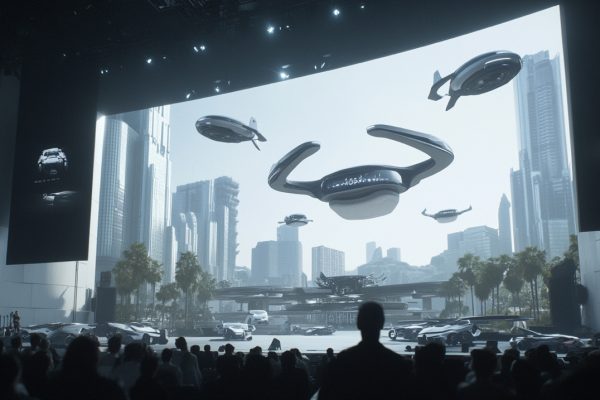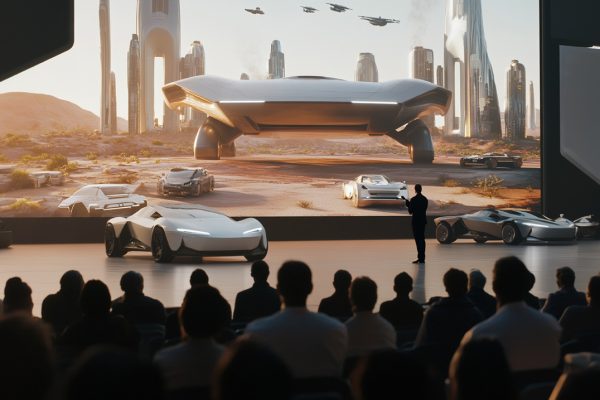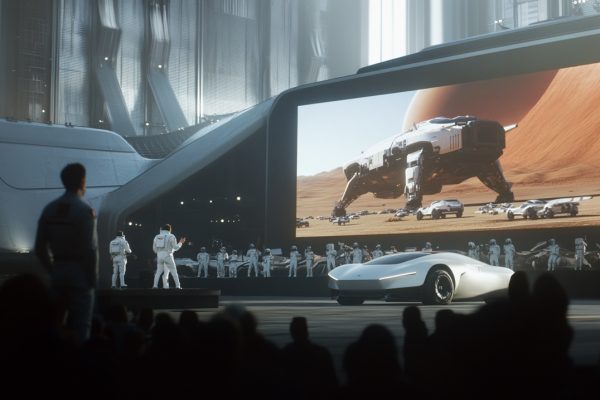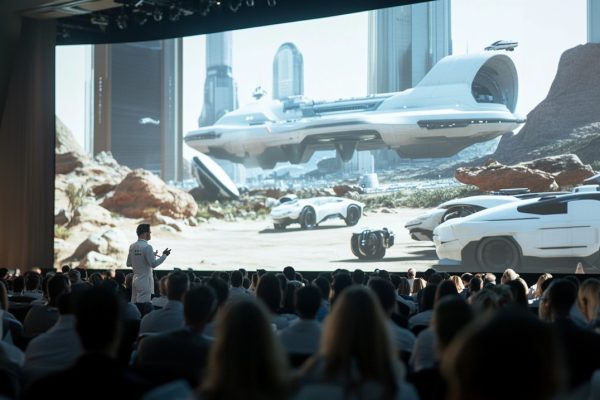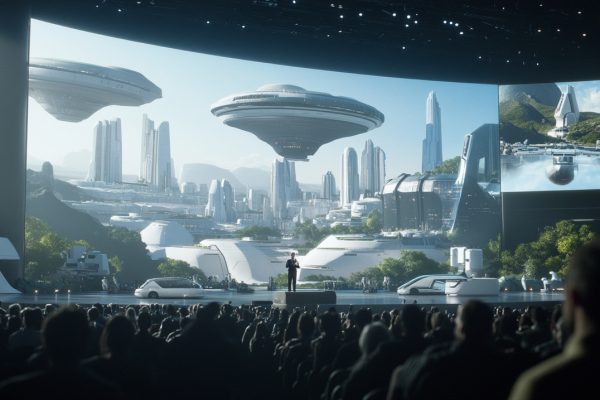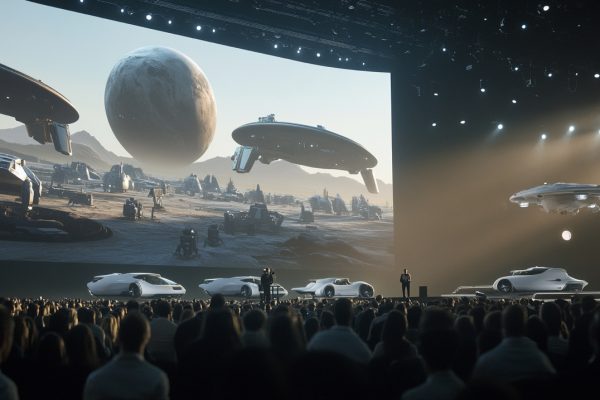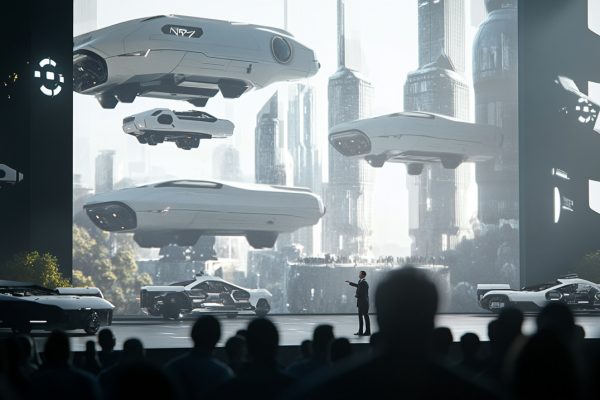
This article builds on recent reflections following an event where right-wing billionaire Elon Musk, in support of Donald Trump’s narrative, launched a series of fake futuristic innovations.
Why do we uncritically accept the future that’s being presented to us? Is it really the one we desire, or have we been conditioned to see it as inevitable? The future gleams in chrome—robots seamlessly navigating smart cities, sleek vehicles coursing through towering skyscrapers, all framed as symbols of inevitable progress. This vision is presented not as a possibility, but as a fait accompli, one that has been preordained by technological determinism.
We embrace this narrative because we have been taught to do so. The dominant ideological framework encourages us to see technological advancement as synonymous with societal progress. Figures like Steve Jobs, who presented the iPhone not merely as a product but as a step toward a smarter, faster future, laid the groundwork for a techno-optimist worldview. Today, Elon Musk’s promise of Mars as humanity’s next frontier further expands this vision, positioning it not just as a technological pursuit, but as a historical imperative—one that makes questioning it seem both futile and retrograde.
But why does this future resonate so deeply with us? Why does it feel so inevitable, so comforting? At its core, this future is a deeply embedded illusion—an ideological construct that promises to resolve all societal ills through technology: inequality, environmental degradation and labor exploitation. Yet beneath this promise lies a critical omission: the narrative fails to question the systems of power and extraction that undergird these technological advances. It tells us there is no need to reconsider the structure of our lives, as long as innovation continues. This is a vision rooted in capitalist ideology—one that operates on the assumption that resources are inexhaustible and that technology will repair the very structures of exploitation it enables.
The central issue is how this future is framed. It presents itself as an inescapable trajectory, one that we are told cannot be avoided. The narrative of technological progress, with its promises of endless growth and consumption, is so entrenched that it becomes indistinguishable from the very notion of progress itself. In this worldview, historical contingency is erased and technological advancement is framed as a natural evolution—a concept that adheres to a technocratic ideology where growth and expansion are seen as the only possible course of human history. This is the trap: the denial of alternatives. The idea that there is no other future to consider but one defined by the logic of expansion and growth.
This framing severely limits our imagination, narrowing the range of acceptable futures. The promise of more—more growth, more consumption, more conquest—becomes so normalized that alternatives seem unthinkable. But life is not a game of infinite growth; unchecked technological expansion has severe consequences. In this technofuturist worldview, human interaction is reduced to transactional exchanges, prioritizing consumption and automation over care and neglecting the ecological constraints we face. The real question isn’t whether we can build bigger, more efficient machines, but whether we should, given the broader social, ecological and political costs of such an endeavor.
The future we are offered is not a break from the past but a continuation of colonial and capitalist impulses, merely dressed in a shiny new coat.
The problem is not merely technological, but ideological. Musk’s vision of Mars, as a new frontier, is an echo of colonial logics—the same logics that justified the conquest of new lands in the pursuit of resources. This vision is dressed in the language of innovation, but it operates on the same principles of domination and extraction that have characterized imperialism throughout history. It’s a post-colonial fantasy, repackaged as technological progress, where the human drive to expand and conquer remains central. The future we are offered is not a break from the past but a continuation of colonial and capitalist impulses, merely dressed in a shiny new coat.
We are sold a story that technology will fix all problems, but it’s a dangerous diversion. The spectacle of space exploration, AI-driven cities and automation hides deeper, unexamined questions: Who benefits from these advancements? Who is left behind? These promises of technological salvation function as distractions, carefully constructed to obscure the social, political and environmental consequences of an unchecked technological expansion driven by capitalist motives.
To confront this future, we must rethink the framework through which we view progress. We must challenge the capitalist assumptions that define technological growth as the highest form of human achievement. Instead, we must prioritize sustainability, equity and human connection. The future we need must value care, recognize our planet’s finite resources, and embrace resilience. We must demand alternatives that serve the people, not the interests of the few.
To break free from technofuturism, we must question the assumptions driving these visions of the future. Who gains, and who is excluded? We must dismantle the technological determinism that equates progress with innovation and recognize that technological advances alone will not solve our societal problems. We must reject the notion that technological progress is an inevitability. Instead, we must call for broader social, political, and cultural transformations that address the true roots of inequality, environmental degradation, and social injustice.
By presenting itself as an inescapable trajectory, [technofuturism] shields the dominant system from critique and eliminates any space for alternative futures.
This technofuture we are sold is capitalism’s greatest illusion. By presenting itself as an inescapable trajectory, it shields the dominant system from critique and eliminates any space for alternative futures. The narrative tells us there is no other way forward, that questioning it is tantamount to rejecting progress itself. But there is another way. It’s time to confront this narrative, peel back its shiny exterior, and demand a future that is genuinely transformative, equitable, and sustainable.
AI generated images
Article written using an AI tools to help extract personal notes into structured content. AI tools were also used to optimise the grammar and the overall cohesion of the text.
The images are generated using Midjourney. A visual exploration of the billionaire oligarch pitching the shiny technofuture on stage, introducing new toys and destinations.

